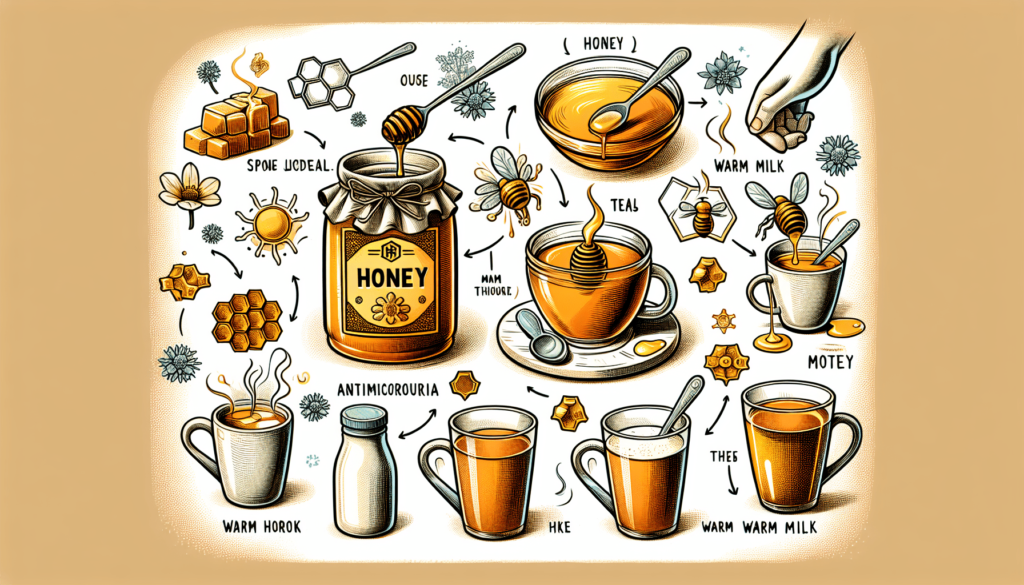Imagine having a persistent cough that just won’t seem to go away. It’s irritating, disruptive, and frustrating. But what if there was a simple, natural remedy that could help ease your cough and soothe your throat? Well, look no further than your pantry. Honey, that sweet and delicious golden syrup, may just be the answer you’ve been searching for. Known for its numerous health benefits, honey has long been used as a natural remedy for various ailments, including coughs. But does it actually work? Can honey really be the solution to your persistent cough? Let’s find out.

What is honey?
Honey is a natural sweet substance produced by bees from the nectar of flowers. It has been used as a food source and a traditional remedy for various ailments for centuries. Known for its unique taste and golden color, honey is treasured not only for its sweetness but also for its potential health benefits.
Definition of honey
Honey is a viscous liquid that is produced by bees through a complex process. Bees collect nectar from flowers and bring it back to the hive, where it undergoes enzymatic changes. The bees then drop the partially dehydrated nectar into honeycomb cells and fan their wings to promote evaporation of the remaining water. This process, along with the enzymes added by the bees, transforms the nectar into honey.
Composition of honey
Honey is composed mainly of carbohydrates, with the most abundant being fructose and glucose. Additionally, honey contains small amounts of vitamins, minerals, enzymes, amino acids, and antioxidants. The exact composition may vary depending on the floral source of the honey, giving rise to different flavors and colors. The natural composition of honey makes it a versatile ingredient with potential health benefits.
Traditional use of honey for cough
Throughout history, honey has been utilized as a natural remedy for respiratory ailments, including coughs. Ancient civilizations, such as the Egyptians and Greeks, documented the use of honey for soothing coughs and throat irritation. The folklore surrounding honey’s effectiveness for cough relief has been passed down through generations, making it a staple in many household remedies.
Historical use of honey for respiratory ailments
Dating back thousands of years, honey has been used orally as a remedy for coughs and other respiratory conditions. Ancient texts from cultures around the world, such as Ayurveda and Traditional Chinese Medicine, mention honey’s therapeutic properties for soothing cough symptoms. These historical accounts highlight the long-standing use of honey as a traditional cough remedy.
Folk remedies involving honey for cough
In various cultures, honey has been incorporated into folk remedies for cough relief. For instance, mixing honey with warm water, lemon juice, or herbal teas has been a common remedy for soothing coughs. Additionally, consuming honey with garlic or ginger has been believed to enhance its effectiveness in relieving respiratory symptoms. These folk remedies showcase the versatility of honey as a cough remedy in different cultural traditions.
Scientific studies on honey and cough
In recent years, scientific research has focused on exploring the potential benefits of honey as a natural remedy for cough. These studies have shed light on the efficacy of honey in alleviating cough symptoms and its possible mechanisms of action.
Research studies on honey’s effectiveness for cough
Numerous clinical trials have investigated the use of honey for cough relief, particularly in children. A study published in the Archives of Pediatrics & Adolescent Medicine found that honey provided better cough relief compared to a common over-the-counter cough medication, dextromethorphan. Another study published in JAMA Pediatrics showed that honey was more effective in reducing nighttime cough and improving sleep quality in children with upper respiratory infections. These research studies provide scientific evidence supporting the use of honey as a natural cough remedy.
Mechanisms of action for honey as a cough remedy
The exact mechanisms by which honey soothes coughs are not fully understood, but several theories have been proposed. Honey’s viscous consistency helps coat the throat, providing a soothing effect. Additionally, honey may possess antibacterial properties, which can help combat respiratory infections. Moreover, the presence of antioxidants in honey may contribute to its potential anti-inflammatory effects, aiding in the reduction of cough severity and duration. While more research is needed to fully understand these mechanisms, these factors suggest that honey holds promise as a natural remedy for cough.

Types of honey for cough relief
Not all honey is created equal when it comes to cough relief. Certain types of honey, such as raw honey, Manuka honey, and buckwheat honey, have been particularly associated with potential benefits for coughs. However, it is essential to understand the characteristics of each type before considering their use as a cough remedy.
Raw honey
Raw honey is honey that has not undergone extensive processing or filtration, thus retaining more of its natural properties. It may contain traces of pollen, enzymes, and propolis, which are believed to contribute to its potential health benefits. Raw honey is often preferred by individuals seeking a more natural approach to cough relief.
Manuka honey
Manuka honey is a special type of honey produced in New Zealand and Australia by bees that feed on the Manuka bush. This honey is known for its unique antimicrobial properties, attributed to an active compound called methylglyoxal. Manuka honey has gained popularity as a natural remedy for various ailments, including coughs.
Buckwheat honey
Buckwheat honey is a dark, robust honey with a distinctive flavor. It has been studied for its potential effectiveness in alleviating cough symptoms. Research published in the journal Pediatrics found that buckwheat honey provided better relief for children’s nighttime cough compared to a placebo. Its darker color and stronger taste make buckwheat honey a unique option for cough relief.
Other types of honey with potential benefits
While raw, Manuka, and buckwheat honey have garnered attention for their potential benefits in cough relief, other types of honey may also offer some advantages. The choice of honey ultimately depends on personal preference and availability. Experimenting with different types of honey may help individuals find the one that provides the most relief for their specific cough symptoms.
Using honey as a cough remedy
When it comes to using honey as a cough remedy, it is important to consider the dosage and frequency of consumption. Additionally, understanding how to combine honey with other ingredients or remedies can further enhance its effectiveness.
Dosage and frequency of honey consumption
The recommended dosage of honey for cough relief varies depending on age and individual circumstances. For adults and children above the age of one, a teaspoon of honey can be taken directly or added to warm beverages, such as herbal teas. It is generally advised not to exceed four teaspoons per day. For children under the age of one, honey should be avoided due to the risk of botulism.
Combination with other ingredients or remedies
To amplify the benefits of honey as a cough remedy, it can be combined with other ingredients or remedies. For example, mixing honey with warm water and lemon juice can provide additional soothing effects for a sore throat. Adding ginger or garlic to honey-infused concoctions may offer potential immune-boosting properties. It is important to note that these combinations should be based on individual preferences and any known allergies or sensitivities.
Benefits of using honey for cough
The use of honey as a natural cough remedy offers several potential benefits beyond just the relief of cough symptoms. These benefits include its soothing effect on the throat, antibacterial properties, and potential reduction of cough severity and duration.
Soothing effect on the throat
The sticky and viscous nature of honey provides a protective layer over the throat, soothing irritation and reducing discomfort associated with coughing. This coating effect can help alleviate the dryness and scratchiness often experienced during a cough.
Antibacterial properties
Honey has been found to possess natural antibacterial properties, possibly due to the presence of hydrogen peroxide and low water activity. These properties may aid in fighting off certain bacterial infections that can contribute to cough development.
Potential reduction of cough severity and duration
Scientific studies have indicated that honey may help reduce cough severity and duration. The soothing properties of honey, combined with its potential anti-inflammatory effects, may contribute to a more rapid recovery from cough symptoms.
Precautions and considerations
While honey is generally considered safe, there are some precautions and considerations to keep in mind when using it as a natural cough remedy.
Age restrictions and honey consumption
It is important to note that honey should not be given to infants under the age of one due to the risk of infant botulism. The immature digestive system of infants is not equipped to handle certain bacteria that may be present in honey. Children over the age of one and adults can safely consume honey as a cough remedy within recommended guidelines.
Possible allergic reactions
Although rare, some individuals may have allergic reactions to honey. Allergies to honey typically present as symptoms such as itching, hives, or even difficulty breathing. If any adverse reactions occur after consuming honey, it is crucial to discontinue use and seek medical attention if necessary.
Consulting a healthcare professional
If you are unsure about using honey as a cough remedy or have any underlying health conditions, it is advisable to consult a healthcare professional. They can provide personalized recommendations based on your specific circumstances and help ensure that honey is a suitable choice for your cough relief.
Comparing honey with other cough remedies
Honey’s effectiveness as a natural cough remedy can be compared to other common options, such as over-the-counter cough syrups and natural alternatives.
Over-the-counter cough syrups
Over-the-counter cough syrups typically contain a combination of active ingredients such as dextromethorphan or guaifenesin. While these medications can provide temporary relief, they often come with potential side effects and may not address the underlying cause of the cough. Honey, on the other hand, offers a natural approach without the risk of adverse effects associated with some over-the-counter medications.
Natural alternatives to honey
Various natural alternatives to honey, such as herbal teas and throat lozenges, are also commonly used for cough relief. While these alternatives may provide some symptom relief, honey is unique in its potential health benefits beyond soothing coughs. Its antibacterial properties and potential reduction of cough severity and duration make it an attractive natural remedy.
Personal experiences and testimonials
Many individuals have shared their personal experiences and testimonials regarding the effectiveness of honey as a cough remedy. While personal anecdotes provide subjective accounts, they contribute to the overall understanding of honey’s potential as a natural cough remedy. These stories highlight the diverse range of individuals who have found relief and support the growing body of evidence surrounding honey’s efficacy.
Individual accounts of honey’s effectiveness for cough
Numerous individuals have reported positive experiences with honey for cough relief. From parents finding comfort in their children’s improved sleep to individuals experiencing a reduction in cough severity, personal accounts illustrate the potential benefits that honey can offer.
Anecdotal evidence supporting honey as a cough remedy
Anecdotal evidence, although not scientifically validated, plays a significant role in establishing honey as a cough remedy in traditional and cultural contexts. The stories passed down through generations, coupled with individual testimonials, provide a collective perception of honey’s efficacy and contribute to its reputation as a natural cough remedy.
Conclusion
Honey has a long-standing history as a natural remedy for coughs and continues to gain recognition through scientific research. Its unique composition, coupled with potential antibacterial and soothing properties, makes it a versatile option for those seeking a natural cough remedy. While honey offers potential benefits, it is essential to consider precautions, dosage guidelines, and individual circumstances. The significance of further research and evidence should not be overlooked, as ongoing studies can provide additional insights into honey’s potential applications for cough relief. As with any medical condition, consulting a healthcare professional is advised before starting any new treatment or remedy. So, the next time you find yourself coughing, consider reaching for that jar of golden honey and potentially discover the natural relief it may provide.
